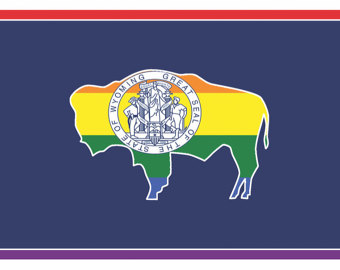The Associated Press reports, “Removing a Wyoming judge from the bench because she won’t perform same-sex weddings would violate her constitutional rights, her lawyer told the state’s top court Wednesday.
But a lawyer for the Wyoming Commission on Judicial Conduct and Ethics told the state Supreme Court that Judge Ruth Neely clearly violated the state code of judicial conduct by saying she wouldn’t preside over weddings for people of the same gender.
Neely, who’s not a lawyer, is a municipal judge in Pinedale and has been suspended from her position as a circuit court magistrate in Sublette County.
The ethics commission investigated Neely after she told a reporter in 2014 that she wouldn’t preside over same-sex marriages. Her lawyers said no same-sex couples have asked her to perform their marriage. The U.S. Supreme Court ruled last year that same-sex couples nationwide may marry.
Lawyer James Campbell of the Alliance Defending Freedom, an Arizona religious advocacy law firm, spoke for Neely at Wednesday’s hearing.
“This case presents significant First Amendment issues,” he told the five judges.
Campbell said Neely only had expressed her opinion about the institution of marriage and hadn’t done anything to show bias or prejudice.
“In 21 years on the bench, Judge Neely has never faced allegations that she’s been unfair to anyone,” he said.
Many prominent judges as well as major world religions share Neely’s opposition to same-sex marriage, Campbell said.
But commission lawyer Patrick Dixon countered that while Neely has a right to private religious beliefs, the court must remove her from office for violating the code of conduct. He said the code prohibits all state judges — from magistrates through supreme court justices — from displaying through their words or actions bias against people on the basis of sexual orientation or other factors.
Dixon said Neely’s case amounted to, “a low point and a black mark in the history of the judiciary in Wyoming.”
Neely’s case has similarities to the legal action in Kentucky against clerk Kim Davis.
A conservative Christian, Davis was jailed briefly last year after she refused to allow her office to issue same-sex marriage licenses. Her case sparked a national debate over the religious freedom of civil servants versus the civil rights of same-sex couples before she ultimately agreed to alter the licenses to remove her name and title.
In Neely’s case, the Wyoming Supreme Court rejected attempts from a group of current and former Wyoming lawmakers as well as national religious organizations to file “friend of the court” briefs in support of Neely. Neely and Campbell declined comment after the court hearing.
Jason Marsden, executive director of the Denver-based Matthew Shepard Foundation and a former Wyoming resident, said Wednesday that society sets standards of judicial conduct for a reason.
“It’s meant to assure the public that everyone that sits on the bench is impartial, and handles cases on their merits, and on the facts and not on any other basis,” Marsden said. “For (Neely) to make the statement that a big chunk of the public is simply not welcome to exercise their constitutional rights in her courtroom flies in the face of everyone’s First Amendment protection that we don’t have an official state religion.”
The foundation is named after the University of Wyoming student who was beaten, tied to a fence and left for dead in 1998. His slaying became a rallying cry in the gay rights movement and a federal hate crimes law now bears his name.”


What Do You Think?